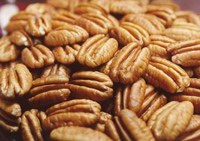
Pecans contain various forms of vitamin E, which are known as tocopherols, and help to protect fats from oxidation. It must be noted that pecans are especially rich in one form of vitamin E – gamma tocopherol.
“Plant foods, including pecans, are rich sources of phytochemicals that can have a unique effect on the body,” says LLU researcher Ella Haddad, DrPH, associate professor, department of nutrition, School of Public Health. “We found that eating pecans increased levels of gamma tocopherol concentrations in the blood and subsequently reduced a marker of lipid oxidation,” adds Dr. Haddad.
Oxidation of fats in the blood, is a process similar to that of rusting, and is thus very harmful for one’s health. When the “bad” cholesterol becomes oxidized, it is more likely to build up and result in arteriosclerosis.
Dr. Haddad has been part of this research study, designed to evaluate the health benefits of pecans. For the study, she analyzed the blood samples of 23 men and women between the ages of 25 to 55, and who ate two types of diets –one that contained pecans and one that did not.
Participants were randomly placed on either the American Heart Association’s Step I diet or a pecan-enriched version of the Step I diet. The pecan-enriched diet was similar to the Step I diet, but replaced 20 per cent of calories with pecans. After four weeks on one type of diet, they then switched to the other diet.
Dr. Haddad’s team found that the pecan-enriched diets significantly reduced lipid oxidation versus the Step I diet. They also found that blood levels of tocopherols were higher after participants were on the pecan diet. Cholesterol-adjusted plasma gamma-toccopherol in the blood samples increased by 10.1 percent after eating the pecan-enriched diet.
Another key finding was that the various photochemical found in pecans seem to be protective of the pecan’s high levels of unsaturated fat. All unsaturated fats in foods can be prone to oxidation. So, the research study found that pecans, which have high unsaturated fat content, are actually self-protective due to their high vitamin E content (tocopherols) and their relatively high content of complex phytonutrients, which are recognized for their ability to slow the oxidation process.
The researchers concluded that these data provide some evidence for potential protective effects of pecan consumption in health individuals. “We concluded that even though the pecan diet was high in unsaturated fats, which one may think would increase blood oxidation that did not happen. We found the opposite result: the pecan diet showed reduced oxidation of blood lipids,” states Dr. Haddad.
